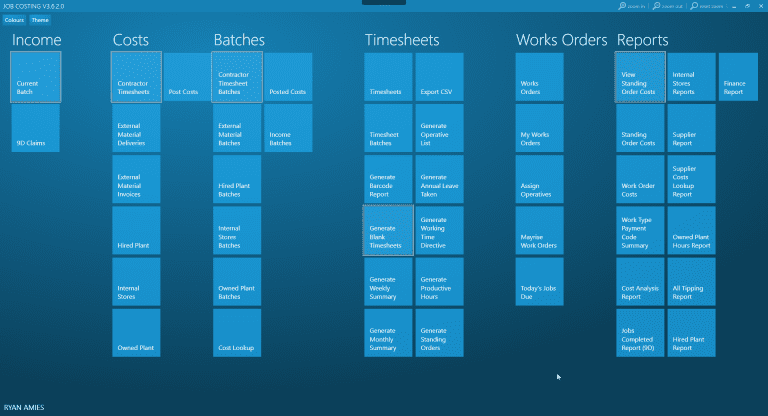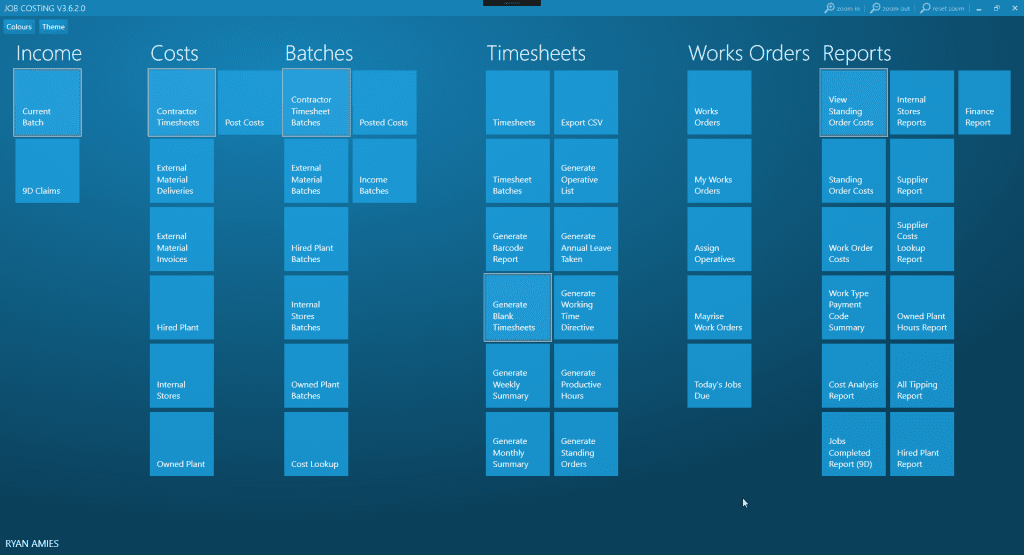Overview – Job Costing for Local Council Highways Department
In 2015, BSPOKE Software introduced a new desktop application called Job Costing for Leicester City Local Council’s Highways Department. BSPOKE Software created this new system to handle every part of road construction and maintenance in the city. The main purpose of Job Costing is to keep track of the income and expenses for each job, making sure work is allocated and scheduled effectively across Leicester. As the central hub for the Highways Department, it is also connected with several other software applications that BSPOKE developed for them. This project marked a significant step in replacing a legacy software system that was outdated and inefficient.
Background and Solution
Job Costing is part of a larger suite of software developed by BSPOKE Software specifically for Leicester City Council’s Highways Department. Before the new custom software suite was deployed, the department used an old system built with Microsoft Access from 1997. Over time, this legacy software system became hard to manage. It relied on third-party software and faced more problems with each Microsoft Access update. The system needed many workarounds and patches just to keep running, which made it increasingly cumbersome and difficult to update.
Realising these issues, BSPOKE Software proposed a modern, integrated solution to replace the outdated legacy software system and improve the department’s entire software suite. This new approach solved ongoing problems and made sure all applications worked together smoothly. Job Costing, as the largest and most important part of this suite, plays a key role in managing the department’s work. This case study will look at the key features and benefits that make Job Costing so important.
Replacing a Legacy Software Systems – Key Features of Job Costing
User-Friendly Interface
Job Costing features a contemporary Windows tiled layout, making it easy for users to navigate. The system organises the home screen into different menus, each representing a section. This setup allows users to quickly access the information and tools they need to work efficiently. The application includes a comprehensive user permission system that controls access to various parts of the software. Some menus are hidden from specific users, while others may only allow view access, ensuring everyone has the appropriate level of access for their role.
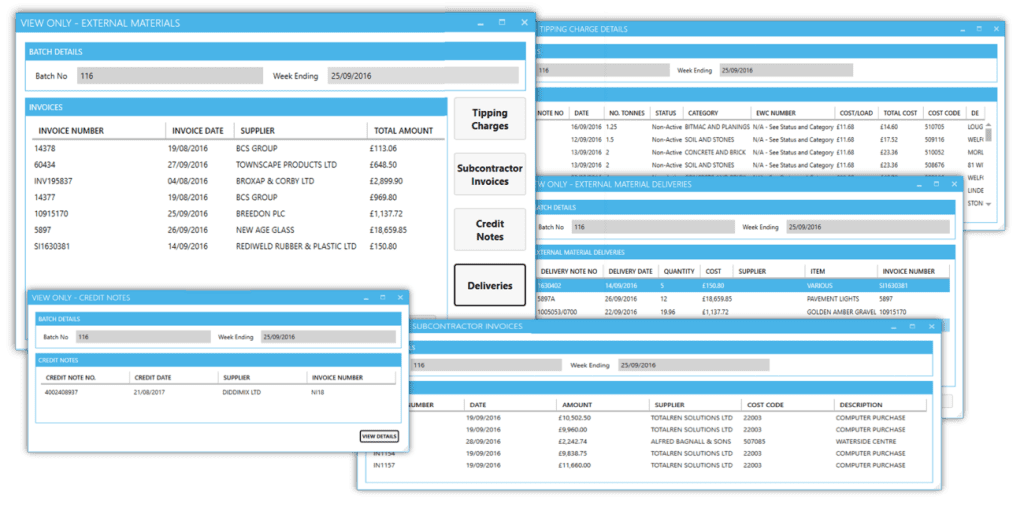
Comprehensive Work Tracking
The system is designed to manage all roadworks in Leicester, focusing on four main areas:
- Work Orders: Managing and scheduling all jobs.
- Labour Hours: Tracking the hours worked by field operatives.
- Associated Costs: Monitoring expenses for vehicles, equipment, and materials.
- Income Received: Recording income from various sources, such as government departments, private companies, and individuals.
Each section is further divided into sub-sections. For example, within the External Material Invoices section, users can handle tipping charges, subcontractor invoices, credit notes, and deliveries.
Integrated Data Sharing
Job Costing connects to a central database, which BSPOKE Software shares with other applications they developed. This setup allows for smooth data sharing between systems. For instance, data from the Stores application can be quickly transferred to Job Costing with just one click, keeping all information current and accessible.
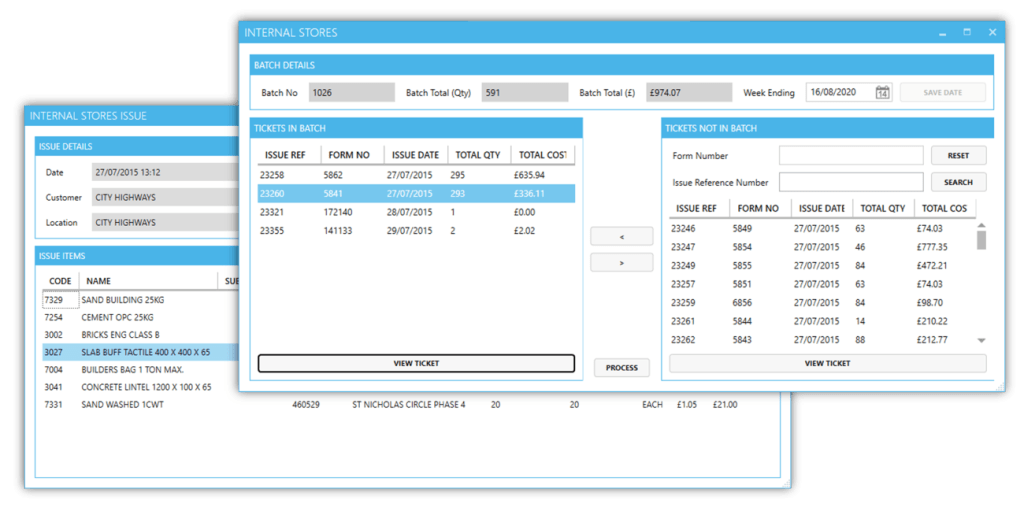
Additionally, we created a background service for Job Costing to work with a third-party application that manages field operatives. This service allows Job Costing to easily get information from the third-party system and automatically update work orders with new, urgent tasks.
Document Production
Document management is a key feature of Job Costing, especially for recording operative hours. The system produces various documents, such as timesheets, pay slips, and annual leave records. One of the most important documents is the Job Card, which includes details of the work, its location, photographs, worksheets, and health and safety information.
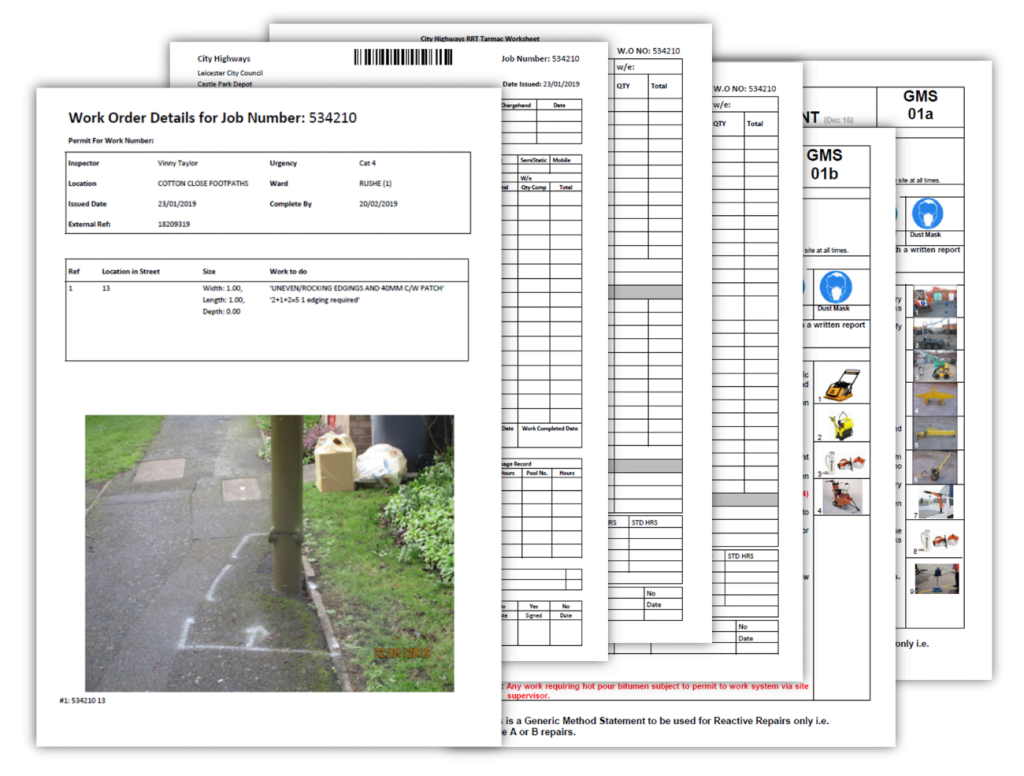
Barcoding for Efficiency
To enhance efficiency, Job Costing includes a barcoding system that helps supervisors quickly assign operatives to specific jobs. By scanning the barcode on a job card and selecting the right operative from a list, supervisors can streamline the allocation process.
Comprehensive Reporting
Reports are crucial to Job Costing, focusing mainly on financial tracking and performance measures. Financial reports help manage expenses and income, providing key information for end-of-year accounting. Performance reports track the duration of each job, highlighting successful completions and identifying delays. Most reports are available for download in Excel and PDF formats, making them easy to share and analyse.
Conclusions for Replacing a Legacy Software System
In conclusion, the new Job Costing application from BSPOKE Software has made a big difference for Leicester’s local council Highways Department. Replacing the old Microsoft Access system with this updated solution has resolved many problems, such as downtime, complex workarounds, and high maintenance costs. The modern system has also greatly improved user experience. The easy-to-use interface and streamlined processes have made it simpler for staff to manage and track roadwork projects, reducing manual tasks and minimising errors. With the new system, users can quickly access necessary information and generate reports, leading to more efficient work and better decision-making.
The modern Job Costing system is user-friendly with its clear Windows layout and integrates smoothly with other applications. This integration allows for quick and accurate data updates, helping the department make better decisions and work more efficiently. The system also supports real-time updates from third-party applications, keeping everything current and organised. By replacing the legacy software system with this new solution, the Highways Department can manage roadwork tasks more effectively, improving both service and cost management.
If your organisation is struggling with an outdated system or looking to enhance its operations, contact BSPOKE Software. Let us assist you in replacing a legacy software system with a cost-effective custom solution, leading to greater efficiency and maximum productivity. Get in touch with us today to learn how we can support your software needs.
